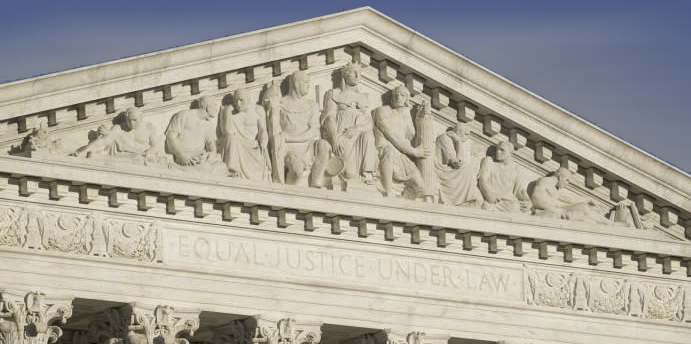Courts & Legislation

The Supreme Court of the United States
The Court's Slip Opinion Scott v. Harris (pdf), April 30, 2007
NY Times:Court Backs Police in Chase That Hurt Driver
LA TIMES: Justices OK Deadly Force in some Police Pursuits
Brief commentary from the justices, officers, and citizens
Tennessee v. Garner, 1985
The U.S. Supreme Court ruled 6-3 that the Fourth Amendment prohibits the use of deadly force to prevent the escape of any fleeing suspected felon unless the suspect poses a “significant threat” to the officer or the community and other means have been exhausted. A 1990 report on police pursuits for the NIJ says: “Under Tennessee v. Garner, it is clear that force must be proportionate to the danger the fleeing person represents.”
Police chases are not the only way to catch fleeing suspects. Law enforcement must think outside the box because too often innocent people and officers themselves are killed or permanently injured ... and the fleeing suspects escape capture or are released with hours of capture!
State Supreme Courts
California Supreme Court
Irma Ramirez v. City of Gardena, 2018
August 13, 2018, the LA Times: California's top court rules for police. The publics comments at the end of the story, show no consideration for the innocent bystanders who are killed, on average, at least three times every week.
July 17, 2018, the LA Times: California's top court to decide what officers must do to escape liability in pursuit crashes. The article mentions the Prianos' efforts with the state legislature and the crash that killed Kristie. Candy Priano's primary goal is preventing the tragedy of pursuit from happening to others, especially innocent bystanders.
Lewis v. Sacramento, 1998
Justice Souter delivered the opinion of the Court: The issue in this case is whether a police officer violates the Fourteenth Amendment’s guarantee of substantive due process by causing death through deliberate or reckless indifference to life in a high-speed automobile chase aimed at apprehending a suspected offender. We answer no, and hold that in such circumstances only a purpose to cause harm unrelated to the legitimate object of arrest will satisfy the element of arbitrary conduct shocking to the conscience, necessary for a due process violation.
Kishida v. The State of California, 1991
The California Supreme Court had spelled out that government personnel were not required to show compliance with their pursuit policy to benefit from immunity. More links to Kishida v. The State of California.
Read and download the PursuitSAFETY factsheet HERE.
Common Sense
The actions of the police should never create an enhanced level of danger to the
surrounding public.
Ret. Washington State Police Chief D.P. Van Blaricom writes: "Officers are strictly prohibited from firing into a crowd, but they are routinely given latitude to pursue a stolen car through urban streets against traffic control devices until a collision terminates the chase. This has happened over and over again throughout the United States and will continue to occur until chief policymakers assert effective administrative control over when and how police vehicular pursuits are to be conducted. Can there be any question that this is a critical public safety issue demanding attention?"
For people who think Kristie's Law is NOT NEEDED
... ask yourself one question:
"If the person you love the most—an innocent, law-abiding citizen—was killed in a vehicular police pursuit and the fleeing driver was not even arrested, would you still think this legislation was not needed?"
Would you be Pursuing Justice?
Pursuit Legislation that puts public safety first will save lives
Candy Priano continues to wait for state legislators from coast to coast to pass preventative measures to change outdated and dangerous pursuit practices to prevent deaths and injuries to other innocent people and, consequently, save lives. One death is one too many!






